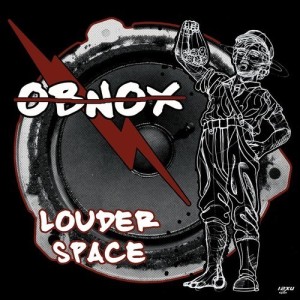I absolutely love storming guitars. That’s why I love these two rekkids.
Something old, something new. Sam “Lightnin'” Hopkins two-volume Herald Recordings (mine are on Collectables; I think they are available on other labels as well), recorded in that very significant year of 1954 (not ’55), make the Houston blueman’s claim to being a father of rock and roll–that’s how much steam he works up on classics like “Blues for My Cookie,” “My Little Kewpie Doll,” and “Lightnin’ Don’t Feel Well.” Though there are no late-night changes of paces, there are some rather amazing instrumentals, like “Hopkins’ Sky Hop.” On Obnox’s Louder Space (on Austin’s perfectly named 12XU label), guitarist/drummer/vocalist Lamont Thomas (formerly of that unjustly obscure band of Ohioan ravers, This Moment in Black History) continues his assault on all things genteel–hey! it’s freaking taken over beyond neighborhoods, can’t you see?–with 12 hard-charging, fuzz-layered, no-let-up toons that conjure memories of prime Stooges, Big Black, and Dirtbombs. There’s a fonk-bomb called “How to Rob (The Punk Years)” (my personal favorite), there’s a redefinition of “Riding Dirty,” and the rekkid closes with a great dirge, titled, with perfect justification, “Feeling Real Black Today.” I just played the whole thing thing three times in a row. I think Lightnin’ would have loved it.
Frank Sinatra and Antonio Carlos Jobim: The Complete Reprise Recordings (Reprise)
I am half-deep in Will Friedwald’s Sinatra: The Song is You, which veers from near hagiography–I have never seen so many absolutes (“always,” “never”) from such an esteemed writer–to glowing, revelatory descriptions of classic sessions that argue that, in contrast to, say, Elvis, Ol’ Blue Eyes was in near-total control of his art, from modulating his justly-legendary voice to stopping sessions to make astute suggestions to producers, conductors, and musicians. When he got his own label, he went a little nuts, recording way too often with too few heads to butt against, resulting, with the help of the normal hell aging wreaks on a singer, in many records you could skip (can’t say that about his previous Capitol output). This one, though, is a real beauty. Sinatra comes to bossa nova a little late (1967–Getz got there in ’64), but I would argue this is the most fully realized statesize stab at the genre, and if you take umbrage with the claim Sinatra was a jazz singer–that his instrument was flexible to the degree of experimentation–well, gather yourself for this aural rebuttal. He’s close-miked, his every exhalation–no common matter with bossa nova!–sustained sibilance, and register-dives part of the music, and Jobim’s lighter vocal accompaniment and nimble guitar surround and respond to him just like those Nelson Riddle arrangements used to on Capitol. It’s a masterpiece. I am not sure I don’t like it better than In the Wee Small Hours of the Morning. On a vocal level alone, no self-respecting George Jones fan should be without it.
Heartless Bastards: “Got Down Last Saturday Night” b/w Wussy: “Breakfast in Bed” (Shake It Records)
This is the third in a four-45 tribute to the Muscle Shoals guitarist Eddie Hinton. I am not a huge fan of the Heartless Bastards, but the only thing they do wrong here is wind up too early; right as you are loving it, it’s over. Actually, though, I bought this as a gamble: the original “Breakfast in Bed,” which Hinton played on but did not write, was one of the many highlights of Dusty Springfield’s Dusty in Memphis, and Springfield sings it so exquisitely, with such a lethal combination of compassion, soul, and delicate raunch, that no singer in his or her right mind should ever go near it. Lucinda Williams, the Americana Joan Baez, tried, and had her limitations ripped out and shown to her the second before she–figuratively, of course–fell dead on the studio floor. How would Wussy’s Lisa Walker, whose imprecise pitch strikes one as either extremely fetching (if you are me) or a deal-breaker (if you are just mean), fare against the memory of a singer so ethereal, hip, Southern, and, it’s true, geisha-like–at least on that one album–that many listeners didn’t realize she was white and British? Like her band (“our people,” as partner-singer/songwriter Chuck Cleaver calls them), up against similarly daunting and virtuosic predecessors in Memphis’ American Studios session men, she puts her head down and attacks the song like it’s happening to her. Ragged and passionate, she and the band do justice. An essential pickup for Wussy fans, and a victory against the insidious musical creep of technophilia and gentility.
The original, to hear what they were up against:
The American Song-Poem Anthology (Bar/None Records)
Once upon a time, you could scribble down your song lyrics, send ’em off with a check, and professional musicians would create a song around them–even if, in your song, you thought tangerines were yellow (and your song was called “I Like Yellow Things”). I am late to the party on this strange, strange compilation, but it is oddly unsettling, and infernally catchy. Example: the title song, which at first struck me as surreal and unhinged, then earwormed me for a few days, then had its mystery revealed by my wife Nicole, who matter-of-factly stated what the difference was. I will leave it to you as an enducement to try this very American, very weird record. Do you know the difference between big wood and brush? And do you know musical geniuses killed themselves trying to make these records for people like you?




